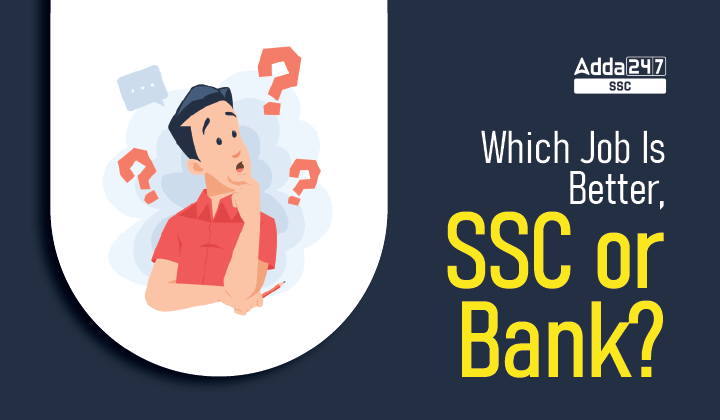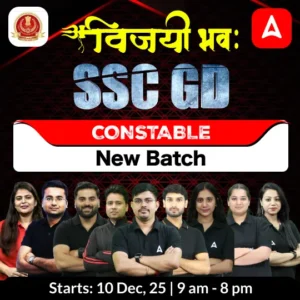With the advent of new technologies such as Artificial Intelligence and Machine Learning, a lot of jobs that are repetitive in nature are going to be replaced by machines in a few years. In such a dynamic future, the various government jobs offered by the Public Sector Banks and recruiting agencies like the Staff Selection Commission will be the main employers that will offer a secure future for the candidates.
The recruitment in such government institutions is done by conducting competitive examinations at the national level. The candidates who opt to prepare for such exams are often confused about which would be better for them. Deciding this is very important as this inspires them to put in the hard work required to crack such exams and secure their dream jobs. In this article let us look at the various aspects of the SSC and Banking jobs. We hope these points help the candidates make an informed decision.
Which is Better, SSC or Banking Job?
This is not a question that can be answered in one word or sentence. The answer to such a complex question is dependent on many factors and can be different for each candidate. There is no hard and fast rule that a candidate has to choose either one of them. He/She can opt for one of them, both of them or even none of them depending upon their inclinations. In the table below, let us look at the top exams conducted by SSC and Banks.
| SSC Exams | Banking Exams |
| SSC CGL | RBI Grade B |
| SSC CHSL | RBI Assistant |
| SSC JE | SBI PO |
| SSC GD | SBI Clerk |
| SSC CPO | IBPS PO |
| SSC MTS | IBPS Clerk |
| SSC JHT | IBPS SO |
| SSC Stenographer | IBPS RRB |
| SSC Selection Post | NABARD Grade A |
| IDBI Recruitment | |
| SIDBI Recruitment | |
| SEBI Grade A | |
| NIACL Recruitment |
SSC Jobs
Before going through the various aspects of the different jobs offered by SSC Recruitment, let us get a sense of what is the nature of these jobs. The posts for which the Staff Selection Commission conducts recruitment drives generally belong to the Group B, C & D levels in the hierarchy of government jobs.
The candidates selected for these posts hold key positions in various ministries and departments. The table below will help the candidates get an idea about the nature of various posts under SSC Recruitment.
| Exam | Posts | Nature of Work |
| SSC CGL | Assistant Audit Officer, Juniors Statistical Officer, Assistant Section Officer, Inspector, Sub Inspector, Upper Division Clerk and Tax Assistant among others. | Office Work, Field Work or a combination of both. |
| SSC CHSL | Lower Division Clerk, Junior Secretariat Assistant and Data Entry Operator | Office Work and Clerical Work. |
| SSC JE | Junior Engineer in various government departments | Field Work |
| SSC GD | Constable (General Duty) in BSF, CRPF, CISF, SSB, ITBP, AR and SSF | Active Duty in key armed forces of India. |
| SSC CPO | SI in Delhi Police and CAPF | Active Duty |
| SSC MTS | Multi Tasking Staff and Havaldar (CBIC & CBN) | Clerical Work and Field Work |
| SSC JHT | Junior Hindi Translator, Junior Translation Officer, Junior Translator, Senior Translator and Senior Hindi Translator | Translation Work |
| SSC Stenographer | Stenographer Grade C & Grade D in various departments | Typing and Transcribing Work |
| SSC Selection Post | Various Posts depending on the availability of vacancies | Multiple Job Profiles |
Banking Jobs
The Banking Sector offers a large variety of posts to the candidates. In discussing the nature of these jobs, we should understand that unlike the SSC which offers different posts in various departments, the banking sector provides similar posts in different institutions.
For example, the entry-level posts across most banks are that of the Clerk, Probationary Officer and Specialist Officer exam recruited through exams conducted by IBPS and SBI. Some banks such as the RBI, NABARD, SEBI, IDBI etc. carry out their own recruitment for various positions. In the table below, let us look at the nature of work in these posts.
| Post | Nature of Work |
| Probationary Officer | Handling Customer Transactions and Issues |
| Clerk | Accepting deposits, facilitating withdrawals, verifying cheques, issuing demand drafts, etc. |
| Agriculture Officer | Promoting Loans and Deposit in Rural Areas |
| IT Officer | Maintenance and updation of the Hardware and Software needs of the office. |
| Law Officer | Managing and representing the bank in all legal matters. |
| Rajbhasha Adhikari | Translation of important official documents in local languages. |
Difference Between SSC and Bank Job
The points discussed above should give the candidates a pretty good idea regarding the nature of work in the various posts offered by the SSC and Bank Recruitments. In this section let us look at some of the key differences that the candidates will experience after joining the posts offered in these jobs.
| Parameters | SSC Job | Bank Job |
| Work Type | The SSC jobs involve fieldwork as well as desk work. | The Bank jobs mostly involve public engagement and clerical work depending on the post. |
| Selection Process | Tier 1, Tier 2 and DV or Tier 1 and DV or Tier 1, Physical Efficiency Test and DV (depending on the post) | Prelims, Mains and Interview or Written Exam and Interview. |
| Salary |
The salary in SSC jobs gets revised every 10 years under pay commission. | Bank Employees’ salary gets revised every five years with many allowances and perks |
| Transfers | Candidates get transferred after completing a fixed period of time at a place with high chances of home state postings | In banks, the candidates get transferred frequently. |
| Promotions |
In SSC the promotion rate is slower apart from a few posts | The chances of getting a promotion are higher in Bank Jobs. |
SSC and Banking Exams: Eligibility Criteria
As mentioned above there are a number of recruitment exams conducted by the Staff Selection Commission and the eligibility criteria for each exam is different from the others. Similarly, the recruitments done by various banks for multiple posts require the candidates to fulfill the eligibility criteria specific to those posts.
In the table below we have provided the age limit and educational qualification needed to be eligible for the most popular exams conducted by the SSC and various public sector banks. The candidates should keep in mind that the SSC exams listed here are only three out of the large number of recruitments conducted by the commission. These exams have been chosen to showcase the range of candidates who can appear for these exams.
| Category | Age Limit | Educational Qualifications |
|---|---|---|
| SSC |
|
|
| Banking |
|
Clerk & PO: Degree (Graduation) in any discipline |
How to Choose Between SSC and Bank Jobs
The decision regarding which is better: bank or SSC totally depends on the interest and aptitude of the candidate. As this is the digital age, all the information required to make a smart decision is available for the reference of the candidates. They should analyze all the options available to them and ask themselves if they want to work under which job profile and which scenarios. Given below are some points that the candidate should consider while making the final decision.
- Assess which way your mental inclination is in terms of the type of work you will be more comfortable doing. For example, if you are someone who has a more dynamic and target-oriented approach, then go for a Bank job. On the other hand, if you are someone who wants to learn the internal workings of the government, then opt for SSC jobs.
- Interact with those who are already working in such banks or ministries that you wish to join in the future.
- Gather more information about the career path of each post as it will provide you with a blueprint for a major portion of your life. Based on that you can plan for other important things in life.
- Also, listen to Toppers’ interviews and strategies to get an idea about the preparation process as it will provide you with an idea of which preparation you are more suited for.
Candidates should keep in mind that the points discussed above are an attempt to present various facts in order to help the candidates make an informed decision as this decision may help them craft a bright future for themselves and their families.
Also, Check



 Upcoming Government Exams, Complete Govt...
Upcoming Government Exams, Complete Govt...
 Govt Jobs 2025, Latest Upcoming Governme...
Govt Jobs 2025, Latest Upcoming Governme...
 SSC Exam Calendar 2025–26 Out, Check All...
SSC Exam Calendar 2025–26 Out, Check All...









